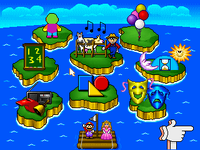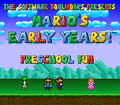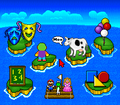Mario's Early Years! Preschool Fun: Difference between revisions
No edit summary |
mNo edit summary Tag: Mobile edit |
||
| (105 intermediate revisions by 22 users not shown) | |||
| Line 1: | Line 1: | ||
{{italic title}} | {{italic title}} | ||
{{ | {{game infobox | ||
|image=[[File:DOSMarioPreschoolFun-1-200.jpg]]<br> | |image=[[File:DOSMarioPreschoolFun-1-200.jpg|250px]]<br>MS-DOS version<br>[[File:mariopre1.jpg|250 px]]<br>SNES version | ||
|developer=[[ | |developer=[[The Software Toolworks]] (Mindscape) | ||
|publisher=[[ | |publisher=The Software Toolworks | ||
| | |release='''MS-DOS:'''<br>{{flag list|USA|1993<ref>{{cite|quote=''Mario's Early Years Preschool Fun'' (music, counting, colors and shapes), ''[[Mario's Early Years! Fun with Numbers|Mario's Early Years Fun With Numbers]]'' (numbers, counting and math), ''[[Mario's Early Years! Fun with Letters|Mario's Early Years Fun With Letters]]'' (alphabet and pre-reading), and ''[[Mario's Time Machine (PC)|Mario's Time Machine]]'' (history) are all scheduled for release during the fourth quarter.|date=October 1993|title=Electronic Games Volume 2 Issue 1|url=https://archive.org/details/Electronic-Games-1993-10/page/n9|publisher=Decker Publications|page=11|language=en}}</ref><ref>{{cite|title=Working Mother|url=https://books.google.com/books?id=9py0wju6wDEC&pg=PA72|publisher=McCall Publishing Co.|date=December 1993|page=72|language=en}}</ref>|Europe|1993<ref name=TiltFR>{{cite|language=fr|publisher=Editions Mondiales S.A.|page=75|date=November 1993|title=''Tilt'' Volume 119|url=https://archive.org/details/Tilt119/page/n73|quote=''Mario a disparu'', ''Mario à l'école'', ''Mario apprend à compter'', ''Mario et la machine à remonter le temps''. Disponible sur PC.|translation=''[[Mario is Missing! (PC)|Mario is Missing!]]'', ''Mario's Early Years! Preschool Fun'', ''[[Mario's Early Years! Fun with Numbers]]'', ''[[Mario's Time Machine (PC)|Mario's Time Machine]]''. Available on PC.}}</ref>}}'''SNES:'''<br>{{flag list|USA|November 1994<ref>{{cite|title=''Nintendo Power'' Volume 67|author=Tilden, Gail, et al.|page=105|date=December 1994|publisher=Nintendo of America|language=American English}}</ref><ref>{{cite|archive=web.archive.org/web/20120917022521/http://www.nintendo.com/consumer/downloads/completeoldgameslist.pdf|title=Old Games List|format=PDF|publisher=Nintendo|accessdate=May 6, 2024}}</ref>}} | ||
|genre=Educational | |languages={{languages|en_us=y|fr_fr=y|de=y}} | ||
|genre=[[Genre#Educational games|Educational]] | |||
|modes=Single player | |modes=Single player | ||
|ratings= | |ratings= | ||
|platforms= | |platforms=[[MS-DOS]], [[Super Nintendo Entertainment System]] | ||
| | |format={{format|dos=1|snes=1}} | ||
|input={{input|pcmouse=1|snesmouse=1}} | |input={{input|pcmouse=1|snesmouse=1}} | ||
|serials='''Super NES:'''<br>SNS-AMEE-USA | |||
}} | }} | ||
'''''Mario's Early Years! Preschool Fun''''', released in Europe as '''''Mario's Playschool''''',<ref> | '''''Mario's Early Years! Preschool Fun''''', released in Europe as '''''Mario's Playschool''''',<ref>{{cite|url=www.youtube.com/watch?v=UNbeCja0M3o|title= Mario's Playschool (PC DOS) (English)|author=LuigiBlood|date=December 5, 2009|publisher=YouTube|accessdate=July 21, 2019}}</ref><ref>{{cite|url=tcrf.net/Mario%27s_Early_Years_(DOS)|title=Mario's Early Years (DOS)|publisher=TCRF|accessdate=July 21, 2019}}</ref><ref>{{cite|url=archive.org/details/marios-playschool-doscd-v1_0_1|title=Mario's Playschool|publisher=Internet Archive}}</ref> is an [[Genre#Educational games|educational game]] released for the [[MS-DOS]]<ref>{{cite|url=www.youtube.com/watch?v=MHjXq1K0Nvk|title=Mario's Early Years - Preschool Fun (PC) - Intro|author=LuigiBlood|date=June 1, 2009|accessdate=May 6, 2024}}</ref> in 1993 and the [[Super Nintendo Entertainment System|SNES]] in 1994 with a demographic of children under six years of age. The game is set around a group of islands, where each island teaches a different subject to the players. The overall design of the game is based on ''[[Super Mario World]]'', where the character graphics are taken from it while the music features rearrangements of various tracks. | ||
This was the last of three educational games to be released in the ''[[Mario Discovery | This was the last of three educational games to be released in the ''[[Mario Discovery Series|Mario's Early Years!]]'' series, the others being ''[[Mario's Early Years! Fun with Letters]]'' and ''[[Mario's Early Years! Fun with Numbers]]''; as such, the game is very similar to the first two games of the series. The main difference between this entry is that the subjects in the islands cover a more general learning, such as learning opposites, colors, and animals. The game, alongside the other two ''Mario's Early Years!'' titles was re-released under ''[[Mario's Early Years! CD-ROM Collection]]'' in 1994. | ||
== | ==Gameplay== | ||
[[File:MEYPF CDROM MainMenu.png|thumb|left|The main menu in the ''CD-ROM Collection'' version]] | |||
''Mario's Early Years! Preschool Fun'' is a point-and-click game, similar to other edutainment titles and the first two games of the ''Mario's Early Years!'' series. Players control the mouse cursor with the mouse in the MS-DOS version of the game, and the SNES version uses the controller that imitates mouse functions; the SNES Mouse is compatible with this game. In each of game's worlds, when the worlds are clicked, the Fun Friends instruct players how to proceed, and remind players to wake Luigi up before playing a game. In worlds where players need to pick objects to proceed, the character moves and jumps according to a clicked location. If an item is clicked on, the character runs and jumps, hitting the item as if it were a [[block]]. Clicking on the various [[Warp Pipe|Exit Pipes]] takes players to further parts of the level, while clicking on Warp Pipes with an arrow pointing at them (yellow in the MS-DOS version, green in the SNES version) takes player back to the main menu. | |||
{{br|left}} | |||
==Characters== | |||
===Playable characters=== | |||
The playable characters are the same across all three ''Mario's Early Years!'' titles. Players can pick their character by clicking on them in the main menu screen. In the MS-DOS version of the game, [[Mario]] and [[Princess Peach|Princess Toadstool]] are the playable characters. In the SNES version of the game, Yoshi is added as a playable character. | |||
<gallery> | |||
MarioPlayschoolFunDos.png|[[Mario]] (MS-DOS) | |||
MEY SNES Mariosprite.png|Mario (SNES) | |||
MEY DOS Toadstoolsprite.png|Princess Toadstool (MS-DOS) | |||
MEYFWLSNESPrincessPeach.png|[[Princess Peach|Princess Toadstool]] (SNES) | |||
MEY SNES Yoshisprite.png|[[Yoshi]] (SNES exclusive) | |||
</gallery> | |||
===[[ | ===Supporting characters=== | ||
{|width=100% class=wikitable | |||
|-style="background:#FF2400; color:white;" | |||
!Image | |||
!Name | |||
!Description | |||
|- | |||
| align="center" |[[File:LuigiPlayschoolFunDos.png]][[File:MEYFWLSNESLuigiSprite.png]] | |||
|align="center"|[[Luigi]] | |||
|Luigi is found sleeping in most worlds. Players need to click on him to wake him up to start playing the games. He additionally shows up in the title screen, helping to assemble the letters. | |||
|} | |||
=== | ===Fun Friends=== | ||
These characters instruct players and congratulate them if they made the correct choices in the stages. Subtitles are present in the SNES version of the game. | |||
<gallery> | |||
BowserPlayschoolFun.png|[[Bowser]] (MS-DOS) | |||
GaloombaPlayschool.png|[[Galoomba|Goomba]] (MS-DOS) | |||
MEY SNES Goomba.png|[[Goomba]] (SNES) | |||
MEY SNES Goomba (small).gif|Goomba (SNES) | |||
MEY SNES Koopa Troopa.png|[[Koopa Troopa]] (SNES) | |||
LudwigVonKoopaPlayschool.png|A Koopa Troopa dressed like [[Ludwig|Ludwig von Koopa]] (MS-DOS) | |||
MEY DOS Monkey striped.png|Monkey (striped) (MS-DOS) | |||
MEY DOS Monkey purple.png|Monkey (purple) (MS-DOS) | |||
MEY DOS Piranha Plant.gif|[[Piranha Plant]] (MS-DOS) | |||
MEY SNES Piranha Plant.gif|Piranha Plant (SNES) | |||
LakituPlayschool.png|[[Lakitu]] (MS-DOS) | |||
LakituSNESPlayschool.png|Lakitu (SNES) | |||
MEY SNES Yoshi-species.png|[[Yoshi (species)|Yoshi]] (SNES) | |||
</gallery> | |||
===[[ | ==Worlds== | ||
''Mario's Early Years! Preschool Fun'' contains seven worlds in the DOS version of the game, six worlds in the SNES version of the game, and eight worlds in the CD-ROM collection version of the game. When the worlds are completed, players are automatically taken back to the main menu, which also acts as the world selection. | |||
{|width=100% class=wikitable | |||
= | |-style="background:#FF2400; color:white;" | ||
!colspan=2 width=1%|Image||rowspan=2|World||rowspan=2|Description | |||
|-style="background:#ff7f50;" | |||
= | !MS-DOS||SNES | ||
|- | |||
|[[File:BodyWorldPC.png|150px]] | |||
===[[Sing Song World (Mario's Early Years! Preschool Fun)|Sing Song World]] | |[[File:Body World.png|150px]] | ||
!align=center|[[File:MEYPF Body World Sprite.png]]<br>[[Body World]] | |||
|Represented by a person with colored body parts, this world contains a grassy area with mountains in the background. Here, the player can click on some of Mario's body parts, and the amount of body parts the player can click on depends on the version of the game. The player can also click the monkeys in the background, causing them to wave. The sun in the background can be clicked, causing it to raise its eyebrows. | |||
|- | |||
|[[File:MEYPF DOS Color World1.png|150px]] | |||
|[[File:Color World.png|150px]] | |||
!align=center|[[File:MEYPF Color World Sprite.png]]<br>[[Color World]] | |||
|Represented by colorful balloons, in this world, the player must wake Luigi up first. Then the game indicate some pictures and their color. The player must click on the indicated object. | |||
|- | |||
|[[File:MEYPF DOS Counting World.png|150px]] | |||
|[[File:Counting World 2.png|150px]] | |||
!align=center|[[File:MEYPF Counting World Sprite.png]]<br>[[Counting World (Mario's Early Years! Preschool Fun)|Counting World]] | |||
|Represented by numbers on a chalkboard, this world is similar to a child playroom. Here, the player can count objects. When a group is tapped, the objects will be counted while the children in the room show the number with their fingers. In the CD-ROM collection version of the game, Mario's Kitchen from the ''[[Mario's Early Years! Fun with Numbers]]'' [[Counting World (Mario's Early Years! Fun with Numbers)|Counting World]] version is included. | |||
|- | |||
|[[File:MEYPF DOS Listening World1.png|150px]] | |||
|[[File:Listening World.png|150px]] | |||
!align=center|[[File:MEYPF Listening World Sprite.png]]<br>[[Listening World]] | |||
|Represented by a radio, whistle, and bell, this world is similar to a farm. Here, the player must wake up a sleeping Luigi to start. Three animals are shown and a sound is played. The player must click the animal that makes the indicated sound. In the MS-DOS version of the game, three more stages are added. | |||
|- | |||
|[[File:MEYPF DOS Opposite World1.png|150px]] | |||
|[[File:Opposite World.png|150px]] | |||
!align=center|[[File:MEYPF Opposite World Sprite.png]]<br>[[Opposite World]] | |||
|Represented by opera masks, in this world, the player must wake Luigi up first. The player must then click the opposite item to the one that is being indicated at the top of the screen, with three different stages. | |||
|- | |||
|[[File:MEYPF DOS Shape World1.png|150px]] | |||
|[[File:Shape World 2.png|150px]] | |||
!align=center|[[File:MEYPF Shape World Sprite.png]]<br>[[Shape World (Mario's Early Years! Preschool Fun)|Shape World]] | |||
|Represented by three colored shapes, this world contains many art-related objects, such as pencils and ink jars. Here, the player must click on the indicated forms to make a picture. Players need to click on a sleeping Luigi to start the game. When a form is clicked, the character approaches and strikes it, resulting in the form being transported to the canvas. | |||
|- | |||
|colspan=2 align=center|[[File:MEYPF DOS Sing Song World.png|150px]] | |||
!align=center|[[File:MEYPF Sing Song World Sprite.png]]<br>[[Sing Song World (Mario's Early Years! Preschool Fun)|Sing Song World]] | |||
|Exclusive to the MS-DOS version of the game, it is represented by Old MacDonald with cows, a cat, wooden fence, and musical notes. This is a world where nursery rhymes/children songs are reenacted with the Mario cast. The included songs are "{{wp|I'm a Little Teapot}}", the English alphabet song, "{{wp|Old MacDonald Had a Farm}}", "{{wp|The Wheels on the Bus}}", and "{{wp|Itsy Bitsy Spider}}". | |||
|- | |||
|colspan=2 align=center|[[File:MEYPF DOS Time World.png|150px]] | |||
!align=center|[[File:MEYPF Time World Sprite.png]]<br>[[Time World]] | |||
|Exclusive to the European CD-ROM release and the ''Mario's Early Years! CD-ROM Collection'' version of the game, this world deals with time-related subjects. Players watch through the seasons, life cycles for people, plants, butterflies, and frogs, the months of a calendar, and the day and night. | |||
|} | |||
==Console differences== | ==Console differences== | ||
The SNES version of the game is largely the same as the PC edition, but with some differences due to reduced space. | The SNES version of the game is largely the same as the PC edition, but with some differences due to reduced space. | ||
*The main menu of the DOS version of the game uses a rearrangement of the map theme for [[Donut Plains]] while the SNES version uses the title screen theme. The icons are also in slightly different places. | |||
*Options to turn off music/sounds/voice clips, randomize the questions, and show text in worlds that have it were removed. | *Options to turn off music/sounds/voice clips, randomize the questions, and show text in worlds that have it were removed. | ||
*The help screen with tips on how to continue learning outside of the program was removed. | *The help screen with tips on how to continue learning outside of the program was removed. | ||
| Line 58: | Line 126: | ||
==Gallery== | ==Gallery== | ||
{{ | {{main-gallery}} | ||
<gallery> | <gallery> | ||
MEYPF DOS Title Screen.png|Title screen (MS-DOS) | |||
MEYPF DOS MainMenu.png|Main menu (MS-DOS) | |||
MEYPF SNES Title Screen.png|Title screen (SNES) | |||
MEYPF SNES MainMenu.png|Main menu (SNES) | |||
MarioPlayschoolFunDos.png|[[Mario]] (MS-DOS) | |||
MEY SNES Mariosprite.png|Mario (SNES) | |||
DOSMarioPreschoolFun-alt.png|North American MS-DOS alternative box art | |||
</gallery> | </gallery> | ||
==Quotes== | |||
Some quotes from Fun Friends instructing players are compiled from separate sound bytes. | |||
*''That works for me!'' | |||
*''Mario likes you.'' | |||
*''Wow, you did it.'' | |||
*''Good choice.'' | |||
*''You did well.'' | |||
*''I like your choice.'' | |||
*''I know that's right.'' | |||
*''Well done.'' | |||
*''You are good!'' | |||
*''Great!'' | |||
*''Good for you.'' | |||
*''You found it!'' | |||
==Media== | ==Media== | ||
{{more | {{media missing|more=yes|SNES and DOS|section=yes}} | ||
{{media table | |||
|file1=MEY DOS - MainMenu.oga | |||
|title1=Main Menu (MS-DOS) | |||
|description1=A rearrangement of the map theme from [[Donut Plains]], [[Twin Bridges]], and [[Chocolate Island]] from ''[[Super Mario World]]'' heard in the main menu in the MS-DOS version of the game. | |||
|length1=0:28 | |||
}} | |||
==Names in other languages== | |||
{{foreign names | |||
|Fre=Mario à l'école | |||
|FreM=Mario at school | |||
|FreC=<ref name=TiltFR/><ref>{{cite|url=www.youtube.com/watch?v=NHKbe5KQQjk|title=Mario à l'école (PC DOS) (Français)|author=LuigiBlood|date=December 5, 2009|publisher=YouTube|language=fr|accessdate=September 7, 2024}}</ref> | |||
|Ger=Marios Vorschule | |||
|GerM=Mario's preschool | |||
|GerC=<ref>{{cite|url=www.youtube.com/watch?v=End8fjK6aXY|title=Marios Vorschule (PC DOS) (Deutsch)|author=LuigiBlood|date=December 5, 2009|publisher=YouTube|language=de|accessdate=September 7, 2024}}</ref> | |||
}} | |||
==References== | ==References== | ||
| Line 76: | Line 177: | ||
{{MEY}} | {{MEY}} | ||
{{ | {{Super Mario games}} | ||
{{SNES}} | {{SNES}} | ||
{{ | {{Computer}} | ||
[[de:Mario's Early Years! Preschool Fun]] | [[de:Mario's Early Years! Preschool Fun]] | ||
[[Category:Mario's Early Years! Preschool Fun|*]] | [[Category:Mario's Early Years! Preschool Fun|*]] | ||
[[Category:Games]] | [[Category:Games]] | ||
[[Category:Super Nintendo Entertainment System | [[Category:MS-DOS games]] | ||
[[Category: | [[Category:Super Nintendo Entertainment System games]] | ||
[[Category:Educational games]] | |||
[[Category:1993 games]] | |||
[[Category:1994 games]] | [[Category:1994 games]] | ||
[[Category:Games unreleased in Japan]] | |||
Latest revision as of 12:55, November 6, 2024
| Mario's Early Years! Preschool Fun | |
|---|---|
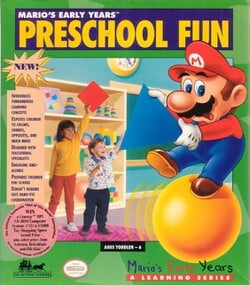 MS-DOS version 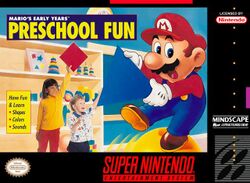 SNES version For alternate box art, see the game's gallery. | |
| Developer | The Software Toolworks (Mindscape) |
| Publisher | The Software Toolworks |
| Platform(s) | MS-DOS, Super Nintendo Entertainment System |
| Release date | MS-DOS: SNES: |
| Language(s) | English (United States) French (France) German |
| Genre | Educational |
| Mode(s) | Single player |
| Format | Super NES: Home computer system:
|
| Input | Super NES: Home computer system:
|
| Serial code(s) | Super NES: SNS-AMEE-USA |
Mario's Early Years! Preschool Fun, released in Europe as Mario's Playschool,[6][7][8] is an educational game released for the MS-DOS[9] in 1993 and the SNES in 1994 with a demographic of children under six years of age. The game is set around a group of islands, where each island teaches a different subject to the players. The overall design of the game is based on Super Mario World, where the character graphics are taken from it while the music features rearrangements of various tracks.
This was the last of three educational games to be released in the Mario's Early Years! series, the others being Mario's Early Years! Fun with Letters and Mario's Early Years! Fun with Numbers; as such, the game is very similar to the first two games of the series. The main difference between this entry is that the subjects in the islands cover a more general learning, such as learning opposites, colors, and animals. The game, alongside the other two Mario's Early Years! titles was re-released under Mario's Early Years! CD-ROM Collection in 1994.
Gameplay[edit]
Mario's Early Years! Preschool Fun is a point-and-click game, similar to other edutainment titles and the first two games of the Mario's Early Years! series. Players control the mouse cursor with the mouse in the MS-DOS version of the game, and the SNES version uses the controller that imitates mouse functions; the SNES Mouse is compatible with this game. In each of game's worlds, when the worlds are clicked, the Fun Friends instruct players how to proceed, and remind players to wake Luigi up before playing a game. In worlds where players need to pick objects to proceed, the character moves and jumps according to a clicked location. If an item is clicked on, the character runs and jumps, hitting the item as if it were a block. Clicking on the various Exit Pipes takes players to further parts of the level, while clicking on Warp Pipes with an arrow pointing at them (yellow in the MS-DOS version, green in the SNES version) takes player back to the main menu.
Characters[edit]
Playable characters[edit]
The playable characters are the same across all three Mario's Early Years! titles. Players can pick their character by clicking on them in the main menu screen. In the MS-DOS version of the game, Mario and Princess Toadstool are the playable characters. In the SNES version of the game, Yoshi is added as a playable character.
Mario (MS-DOS)
Princess Toadstool (SNES)
Yoshi (SNES exclusive)
Supporting characters[edit]
| Image | Name | Description |
|---|---|---|
| Luigi | Luigi is found sleeping in most worlds. Players need to click on him to wake him up to start playing the games. He additionally shows up in the title screen, helping to assemble the letters. |
Fun Friends[edit]
These characters instruct players and congratulate them if they made the correct choices in the stages. Subtitles are present in the SNES version of the game.
Bowser (MS-DOS)
Goomba (MS-DOS)
Goomba (SNES)
Koopa Troopa (SNES)
A Koopa Troopa dressed like Ludwig von Koopa (MS-DOS)
Piranha Plant (MS-DOS)
Lakitu (MS-DOS)
Yoshi (SNES)
Worlds[edit]
Mario's Early Years! Preschool Fun contains seven worlds in the DOS version of the game, six worlds in the SNES version of the game, and eight worlds in the CD-ROM collection version of the game. When the worlds are completed, players are automatically taken back to the main menu, which also acts as the world selection.
| Image | World | Description | |
|---|---|---|---|
| MS-DOS | SNES | ||
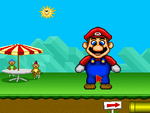
|
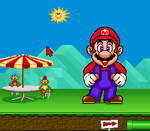
|
Body World |
Represented by a person with colored body parts, this world contains a grassy area with mountains in the background. Here, the player can click on some of Mario's body parts, and the amount of body parts the player can click on depends on the version of the game. The player can also click the monkeys in the background, causing them to wave. The sun in the background can be clicked, causing it to raise its eyebrows. |
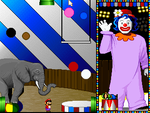
|
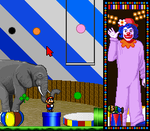
|
Color World |
Represented by colorful balloons, in this world, the player must wake Luigi up first. Then the game indicate some pictures and their color. The player must click on the indicated object. |
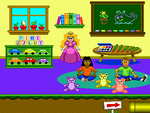
|
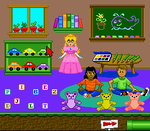
|
Counting World |
Represented by numbers on a chalkboard, this world is similar to a child playroom. Here, the player can count objects. When a group is tapped, the objects will be counted while the children in the room show the number with their fingers. In the CD-ROM collection version of the game, Mario's Kitchen from the Mario's Early Years! Fun with Numbers Counting World version is included. |
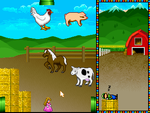
|
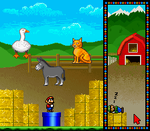
|
Listening World |
Represented by a radio, whistle, and bell, this world is similar to a farm. Here, the player must wake up a sleeping Luigi to start. Three animals are shown and a sound is played. The player must click the animal that makes the indicated sound. In the MS-DOS version of the game, three more stages are added. |
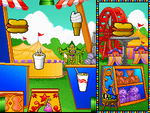
|
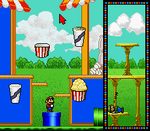
|
Opposite World |
Represented by opera masks, in this world, the player must wake Luigi up first. The player must then click the opposite item to the one that is being indicated at the top of the screen, with three different stages. |
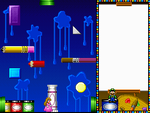
|
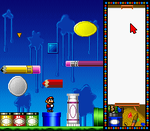
|
Shape World |
Represented by three colored shapes, this world contains many art-related objects, such as pencils and ink jars. Here, the player must click on the indicated forms to make a picture. Players need to click on a sleeping Luigi to start the game. When a form is clicked, the character approaches and strikes it, resulting in the form being transported to the canvas. |
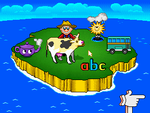
|
Sing Song World |
Exclusive to the MS-DOS version of the game, it is represented by Old MacDonald with cows, a cat, wooden fence, and musical notes. This is a world where nursery rhymes/children songs are reenacted with the Mario cast. The included songs are "I'm a Little Teapot", the English alphabet song, "Old MacDonald Had a Farm", "The Wheels on the Bus", and "Itsy Bitsy Spider". | |
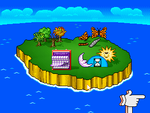
|
Time World |
Exclusive to the European CD-ROM release and the Mario's Early Years! CD-ROM Collection version of the game, this world deals with time-related subjects. Players watch through the seasons, life cycles for people, plants, butterflies, and frogs, the months of a calendar, and the day and night. | |
Console differences[edit]
The SNES version of the game is largely the same as the PC edition, but with some differences due to reduced space.
- The main menu of the DOS version of the game uses a rearrangement of the map theme for Donut Plains while the SNES version uses the title screen theme. The icons are also in slightly different places.
- Options to turn off music/sounds/voice clips, randomize the questions, and show text in worlds that have it were removed.
- The help screen with tips on how to continue learning outside of the program was removed.
- Yoshi was added as a third playable character.
- Various background graphic differences.
- Like its predecessors, Sing Song World was removed.
Staff[edit]
- Main article: List of Mario's Early Years! Preschool Fun staff
Gallery[edit]
- For this subject's image gallery, see Gallery:Mario's Early Years! Preschool Fun.
Mario (MS-DOS)
Quotes[edit]
Some quotes from Fun Friends instructing players are compiled from separate sound bytes.
- That works for me!
- Mario likes you.
- Wow, you did it.
- Good choice.
- You did well.
- I like your choice.
- I know that's right.
- Well done.
- You are good!
- Great!
- Good for you.
- You found it!
Media[edit]
| It has been requested that more audio and/or video files related to this section be uploaded. Specific(s): SNES and DOS Please upload all related music, sound effects, voice clips, or any videos for this section. See the help page for information on how to get started. |
| File info 0:28 |
Names in other languages[edit]
| Language | Name | Meaning | Notes |
|---|---|---|---|
| French | Mario à l'école[3][10] | Mario at school | |
| German | Marios Vorschule[11] | Mario's preschool |
References[edit]
- ^ "Mario's Early Years Preschool Fun (music, counting, colors and shapes), Mario's Early Years Fun With Numbers (numbers, counting and math), Mario's Early Years Fun With Letters (alphabet and pre-reading), and Mario's Time Machine (history) are all scheduled for release during the fourth quarter." – October 1993. Electronic Games Volume 2 Issue 1. Decker Publications (English). Page 11.
- ^ December 1993. Working Mother. McCall Publishing Co. (English). Page 72.
- ^ a b "Mario a disparu, Mario à l'école, Mario apprend à compter, Mario et la machine à remonter le temps. Disponible sur PC." ("Mario is Missing!, Mario's Early Years! Preschool Fun, Mario's Early Years! Fun with Numbers, Mario's Time Machine. Available on PC.") – November 1993. Tilt Volume 119. Editions Mondiales S.A. (French). Page 75.
- ^ Tilden, Gail, et al. (December 1994). Nintendo Power Volume 67. Nintendo of America (American English). Page 105.
- ^ Old Games List (PDF). Nintendo. Retrieved May 6, 2024. (Archived September 17, 2012, 02:25:21 UTC via Wayback Machine.)
- ^ LuigiBlood (December 5, 2009). Mario's Playschool (PC DOS) (English). YouTube. Retrieved July 21, 2019.
- ^ Mario's Early Years (DOS). TCRF. Retrieved July 21, 2019.
- ^ Mario's Playschool. Internet Archive.
- ^ LuigiBlood (June 1, 2009). Mario's Early Years - Preschool Fun (PC) - Intro. Retrieved May 6, 2024.
- ^ LuigiBlood (December 5, 2009). Mario à l'école (PC DOS) (Français). YouTube (French). Retrieved September 7, 2024.
- ^ LuigiBlood (December 5, 2009). Marios Vorschule (PC DOS) (Deutsch). YouTube (German). Retrieved September 7, 2024.
| Mario's Early Years! Fun with Letters / Mario's Early Years! Fun with Numbers / Mario's Early Years! Preschool Fun | ||
|---|---|---|
| Characters | Mario • Luigi • Princess Peach • Toad • Yoshi • Baby Yoshi | |
| Enemies | Piranha Plant • Goomba • Bowser • Larry Koopa • Iggy Koopa | |
| Worlds | Fun with Letters | First Letter World • Vowel World • Alphabet World • Sentence World • Blending Worlda • Building Worldb • Sound World • Last Letter World • Sing Song Worldb • Story Worldb |
| Fun with Numbers | Number World • Counting World • Comparing World • How Many World • Shape World • Same and Different World • Sorting World • Sing Song Worldb | |
| Preschool Fun | Shape World • Counting World • Body World • Listening World • Opposite World • Color World • Sing Song Worldb • Time Worldb | |
| Other | Warp Pipe • Gallery (Preschool Fun) | |
